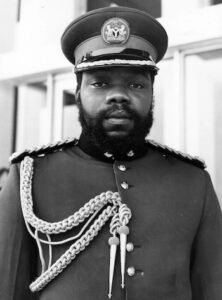
Chukwuemeka Ojukwu
*Chukwuemeka Ojukwu was born on this date in 1933. He was a Black Nigerian military officer and politician.
Chukwuemeka "Emeka" Odumegwu Ojukwu was born in northern Nigeria. He was the son of Sir Louis Odumegwu Ojukwu, an Igbo businessman in the transport business; he took advantage of the business boom during World War II to become the richest man in Nigeria. He began his education at CMS Grammar School, Lagos, at 10. He later transferred to King's College, Lagos, in 1944, where he was imprisoned for assaulting a British teacher who put down a student strike action that he was a part of. At 13, his father sent him to the United Kingdom to continue his education at Epsom College Lincoln College, Oxford University, where he earned a master's degree in history in 1955. He returned to colonial Nigeria in 1956. Ojukwu served as an administrative officer. He later joined the Nigerian army and was rapidly promoted.
Following Nigerian independence in 1960, a group of mostly Igbo junior army officers overthrew Nigeria's civilian government in the 1966 Nigerian coup d'état. Ojukwu became military governor of the predominately Igbo Eastern Region. However, Hausa and Yoruba army officers feared an Igbo-dominated government. In response to Igbo demands for secession, Ojukwu reorganized the Eastern Region as the Republic of Biafra and declared independence from Nigeria. Nigeria invaded Biafra, sparking the Nigerian Civil War. The Nigerian military, with support from the United Kingdom and the Soviet Union, blockaded Biafra and cut food supplies, which created a mass famine. Biafra eventually surrendered to Nigerian forces in 1970 after millions of Biafran civilians died.
Ojukwu fled to the Ivory Coast in exile, where he was granted political asylum. In 1981, newly democratically elected Nigerian president Shehu Shagari granted amnesty to Ojukwu, allowing him to return to Nigeria without facing political or legal consequences from the war. Ojukwu spent the remainder of his life unsuccessfully attempting to return to Nigerian politics as a democratically elected politician rather than a military ruler. He died on November 26, 2011, at 78, in London, England.
His body was returned to Nigeria, where he was buried with full military honors from the Nigerian Army, and thousands of people attended his funeral. Ojukwu remains a contentious figure in Nigeria's history. Many Igbo people regard him as a hero and a messianic figure who did what was necessary to ensure the survival of Nigeria's Eastern population while facing the possibility of genocide after the 1966 coup. Other Nigerians have deemed Biafra's secession unnecessary, blaming Ojukwu for the events of the war and accusing him of oppressing Biafra's non-Igbo ethnic minorities.